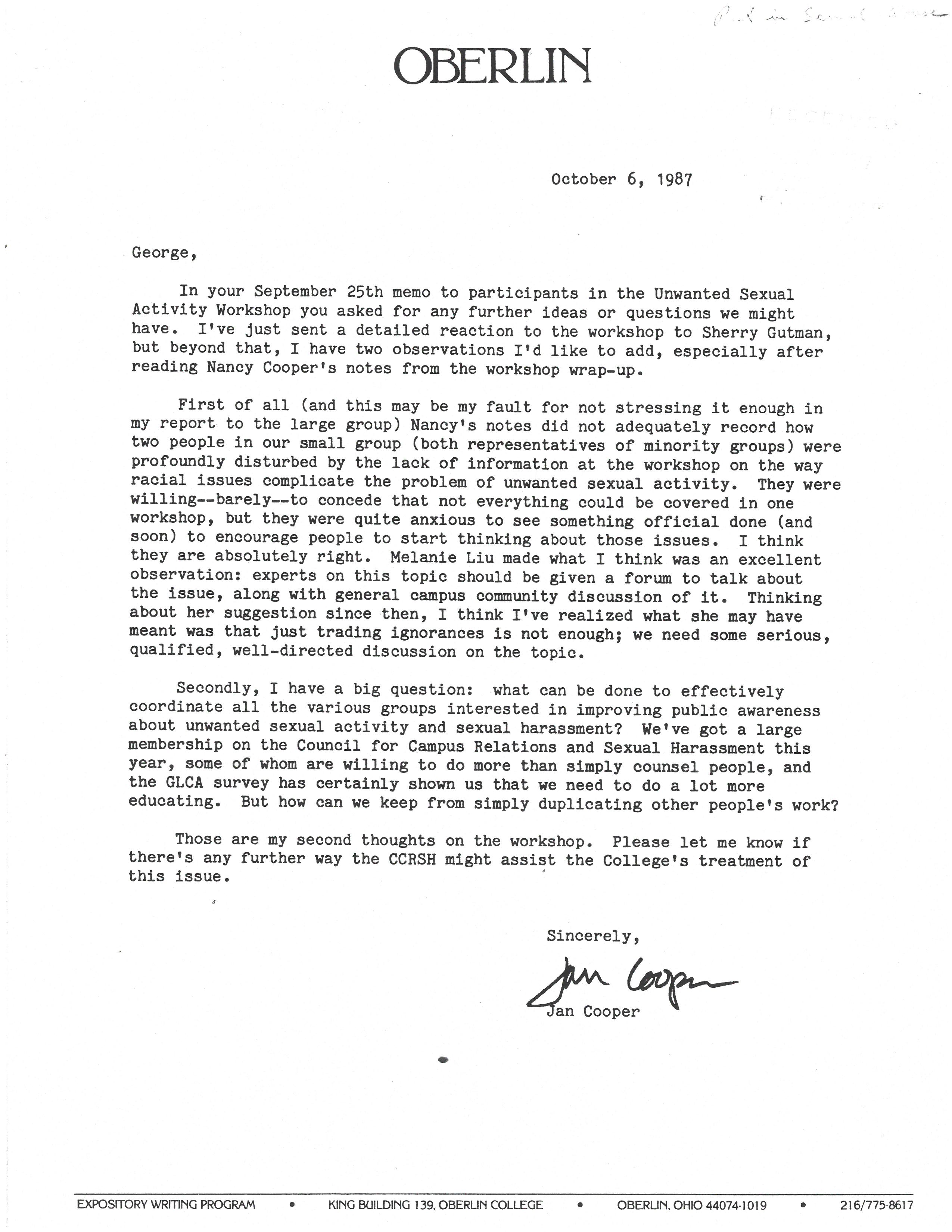
|
Transcription: P[illegible] in Sexual Abuse[1] OBERLIN[2]
October 6, 1987 George,
In your September 25th memo to participants in the Unwanted Sexual Activity Workshop you asked for any further ideas or questions we might have. I’ve just sent a detailed reaction to the workshop to Sherry Gutman,[3] but beyond that, I have two observations I’d like to add, especially after reading Nancy Cooper’s[4] notes from the workshop wrap-up.
First of all (and this may be my fault for not stressing it enough in my report to the large group) Nancy’s notes did not adequately record how two people in our small group (both representatives of minority groups) were profoundly disturbed by the lack of information at the workshop on the way racial issues complicate the problem of unwanted sexual activity. They were willing–barely–to concede that not everything could be covered in one workshop, but they were quite anxious to see something official done (and soon) to encourage people to start thinking about those issues. I think they are absolutely right. Melanie Liu[5] made what I think was an excellent observation: experts on this topic should be given a forum to talk about the issue, along with general campus community discussion of it. Thinking about her suggestion since then, I think I’ve realized what she may have meant was that just trading ignorances is not enough; we need some serious, qualified, well-directed discussion on the topic.
Secondly, I have a big question: what can be done to effectively coordinate all the various groups interested in improving public awareness about unwanted sexual activity and sexual harassment? We’ve got a large membership on the Council for Campus Relations and Sexual Harassment[6] this year, some of whom are willing to do more than simply counsel people, and the GLCA survey[7] has certainly shown us that we need to do a lot more educating. But how can we keep from simply duplicating other people’s work?
Those are my second thoughts on the workshop. Please let me know if there’s any further way the CCRSH[8] might assist the College’s treatment of this issue.
Sincerely, Jan Cooper [signature] Jan Cooper[9]
EXPOSITORY WRITING PROGRAM – KING BUILDING 139, OBERLIN COLLEGE – OBERLIN, OH 44074-1019 – 216/775-8617[10]
[Transcribed by Tory Sparks]
|
[1] There is a faded handwritten notation here, and below is a very faded “RECEIVED” stamp.
[2] Official Oberlin letterhead.
[3] Cheryl Gutman was the Assistant Dean of Residential Life (Kim Perkins,“Administrators Develop Date Rape Judicial Policy,” Oberlin Review, 17 April 1987. Source).
[4] Nancy Cooper served as Assistant Dean of Students/ Residential Life from 1971-1993. She graduated from Oberlin in 1951, and was one of three founding members of Oberlin Student Co-operative Association (“Faculty, Staff, and Trustees,” catalog.oberlin.edu, last modified 2016, Source.; Jamie Hansen, “Off the Cuff: Nancy Cooper” The Oberlin Review, 4 November 4, 2005. Source).
[5] Melanie Liu, at the time of this letter, was an Oberlin graduate and the intern for the Asian American Counselor/Coordinator; she later became the Counselor/Coordinator herself. Liu graduated from Oberlin in 1987 with a degree in biopsychology. She was deeply involved with the Asian American community on campus, and was a committed activist (Jon Bernard, “Alliance to Host Pan-Asian Conference,” Oberlin Review, 11 March 1988. Source.; Anna Kwapien, “Woon given New Post,” Oberlin Review, 20 November 1987. Source.; Oberlin College Yearbook, 1987, O.C.A.).
[6] The Council for Campus Relations and Sexual Harassment was chaired at this time by Jan Cooper and Ray English. Their report from the 1987-1988 school year states that the Council was “charged with assisting member of the College community in the informal resolution of complaints of sexual harassment. Members of the Council offer confidential counseling and support to those who encounter behavior that might be interpreted as harassment. The Council also works to educate the College community about issues of sexual and gender harassment.” For further excerpts from this report, see the Appendix (“Sexual Assault” 1988. Subgroup I. Administrative Records, Series 14. Subject Files, Box 2. Dean of Student Papers, RG 12, O.C.A.).
[7] GLCA is the Great Lakes Colleges Association, which is a “consortium of 13 mid-western colleges (including Oberlin).” The survey being referenced here was conducted by the GLCA in 1987 on female students and their experiences on Oberlin’s campus in regards to gender discrimination and harassment. The survey was very comprehensive, and included questions on a wide variety of situations and aspects of campus life, including student health service, advising, sexual harassment, rape, and resources available to women. Excerpts from the student responses to this survey can be found in the Appendix (“GLCA Recognized Programs,” oberlin.edu, last modified 2016. Source).
[8] The Council for Campus Relations and Sexual Harassment
[9] Jan Cooper began working at Oberlin in 1984 and at this time was an Assistant Professor of English. Currently, she is the John Charles Reid Associate Professor of Rhetoric & Composition (Oberlin College Course Catalog 1987-88, O.C.A.; “Jan Cooper | Arts and Sciences | Oberlin College,” Accessed 20 July 2016. Source).
[10] This is the bottom of the official letterhead.